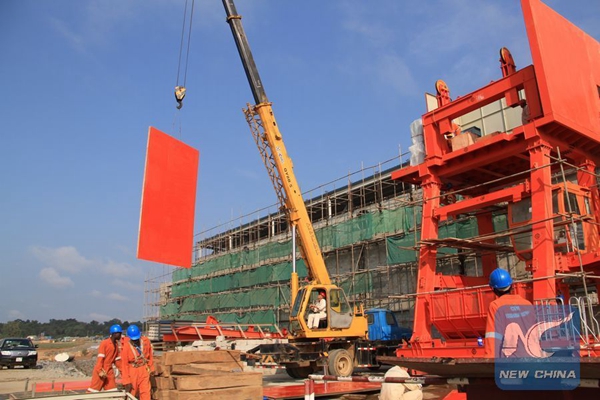Industrial cooperation key to the China-Africa 'win-win development' model
- By Guo Yiming
 0 Comment(s)
0 Comment(s) Print
Print E-mail China.org.cn, September 5, 2018
E-mail China.org.cn, September 5, 2018

Africa can model China's 40-year industrial transformation from a rural economy to an economic powerhouse, and also experience exceptional economic growth and advances in foreign trade, business leaders weighed in on Tuesday.
During the Sixth Conference of Chinese and African Entrepreneurs at the sidelines of the 2018 Forum on China-Africa Cooperation (FOCAC), the business communities of both sides agreed that African countries can model China's best practices in development and pursue industrial cooperation for mutually beneficial development.
Akinwumi Adesina, president of the African Development Bank, noted that infrastructure, especially electricity, is the prerequisite and foundation for Africa's industrial transformation.
According to the World Bank data, only around 42 percent of the population in sub-Saharan Africa had access to electricity in 2016, compared to the world average of 87.4 percent.
Adesina said African countries should also learn from the best practices of China's transformation from a rural economy and achieve major breakthroughs of their own.
Salaheddine Mezouar, president of the General Confederation of Moroccan Companies (CGEM), echoed Adesina's viewpoint, saying that the continent cannot breed competitive industries without decent infrastructure.
While learning from China's success, Mezouar said Africa's industrial transformation will also provide fresh opportunities for Chinese enterprises to engage in win-win cooperation through new models of partnership.
Chinese President Xi Jinping on Monday said China will implement eight major initiatives with African countries in the next three years and beyond, covering areas such as the promotion of industry, infrastructure connectivity, trade facilitation, and green development, as well as provide new funding of US$60 billion to the continent.
Xi said China will work with the African Union to formulate a China-Africa infrastructure cooperation plan and support Chinese companies to participate in Africa's infrastructure development by way of investment-construction-operation or through other models.
The country also vows to undertake 50 aid projects on green development as well as ecological and environmental protection. These projects will focus on climate change, ocean, desertification prevention and control as well as wildlife protection.
Qian Jing, vice president of JinkoSolar, the world's largest solar panel manufacturer, said cooperation in green and sustainable development is vital for building a community for the shared future between China and Africa.
"With its abundant access to sunlight and land resources, combined with vast untapped market potential, there is a lot to expect from Africa's development in renewable energy."
She said Chinese and African companies should shoulder their social responsibilities when seeking win-win cooperation and ensure their projects are green, clean and meet the goals for sustainable development.
Liu Qitao, chairman of the China Communications Construction Company Ltd., which was contracted to build the Mombasa-Nairobi Railway in Kenya, foresaw that China-Africa cooperation will focus more on stimulating the internal driving force of Africa's development.
Chinese companies will move toward industrial integration, production capacity cooperation as well as technology transfer in the African continent to boost its industrialization and modernization process, he noted.
Sun Pishu, chairman of the Inspur Group, a Chinese information technology company, said internet infrastructure is also essential for Africa's industrialization.
"Chinese companies can share their experience and expertise in the latest technologies such as creating smart cities, smart education and smart agriculture so that Africa's path toward industrialization and digitalization will be an easier and smoother one."






Go to Forum >>0 Comment(s)